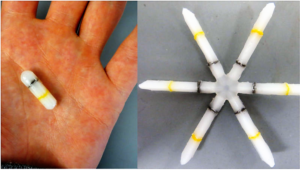- Drug errors ‘common in nursing homes but rarely serious’ (nursingtimes.net)
Medication errors remain fairly common in nursing homes but they appear to result in “surprisingly” low rates of serious impacts affecting residents, according to Australian researchers...researchers set out to assess the prevalence of medication errors leading to hospital admission and deaths in nursing home residents, and to determine the factors associated with these errors...They examined three types of errors – all medication errors, transfer-related medication errors, and potentially inappropriate medications...researchers found that medication errors were common, involving 16% to 27% of residents in studies examining all types of medication errors...Transfer-related medication errors occurred in 13% to 31% of residents, while 75% of residents were prescribed at least one potentially inappropriate medication...investigators noted that it was unclear whether medication errors resulting in serious outcomes were truly infrequent or are under-reported due to the difficulty in ascertaining them.
- Health-care ‘have-nots’: Nevada’s rural residents face fraying safety net (reviewjournal.com)
The dearth of hospitals is just one of the issues threatening the well-being of the roughly 300,000 Nevadans who...live in small towns like Tonopah and other rural communities. A shortage of medical professionals, an increasingly strained emergency care network and escalating costs of health care are threatening to turn them into health-care "have-nots" who pay a steep price for their rural lifestyle...The problem is not limited to Nevada. Across the nation, residents of rural areas are experiencing health-outcome disparities, including "higher incidence of disease and disability, increased mortality rates, lower life expectancies and higher rates of pain and suffering...Rural residents are themselves a public health challenge, as they are generally older, more isolated and less likely to be covered by insurance than their urban counterparts. They’re also more likely to smoke, suffer from obesity and hypertension and die from complications of diabetes.
- Freaky Expanding Pill Stays in Your Gut for Days to Deliver Drugs (gizmodo.com)
The problem with pills is that you have to take them on a regular basis. An innovative new pop-up capsule solves this problem by staying in the stomach for days, where it slowly releases medication over the course of an entire treatment...This “ultra long-acting oral drug delivery” system was developed by researchers at MIT and healthcare firm Lyndra, and it’s changing the way we think about pills. After swallowing, the capsule unfurls into a star-like shape—a configuration that prevents it from entering the digestive tract, while still allowing food to pass. Then, for the next seven to ten days, it stays in the stomach, slowly releasing medication. The star eventually breaks down, allowing it to safely pass through the intestines…this pill will be particularly helpful in the developing world, and for those who have difficulty, for whatever reason, taking drugs as prescribed, including patients with hypertension, diabetes, neurological disorders, and opioid addiction.
- A New Test of Pot’s Potential to Replace Painkillers (theatlantic.com)
Emily Lindley’s stash of marijuana is going to be very, very secure...Lindley, a neurobiologist, is about to begin the first study ever to directly compare cannabis with an opioid painkiller for treating people with chronic pain. She got a grant for this research two years ago, but it has taken that much time to meet all the requirements for working with a drug the federal government still considers highly dangerous...The current status of medical marijuana research is rife with irony. As states have liberalized marijuana laws, they’ve created new opportunities: Lindley’s grant is part of $9 million Colorado awarded for medical research in 2014, using tax money from marijuana sales. But since pot remains illegal at the federal level, researchers have to jump through regulatory hoops—lots of them—to do legitimate research...Physicians have commented for more than a century on the potential for cannabis to substitute for opioid drugs, and several recent studies seem to bolster this hypothesis...The idea has not been tested with rigorous clinical trials, however. Such trials are expensive, and they’re normally paid for by a pharmaceutical company hoping to bring a new drug to market. Because a plant that exists and reproduces in nature can’t be patented, cannabis offers few opportunities for patents (and thus profits), which makes it look like a loser to most companies...Lindley is eager to get on with her study...Given that so many people are already self-treating with marijuana, Lindley says, it’s important to know whether there are actually therapeutic effects. “I’m not a proponent one way or another,” she says. “I think we need to do the research.”
- This Week in Managed Care: November 23, 2016 (ajmc.com)
Sara Belanger with The American Journal of Managed Care. Welcome to This Week in Managed Care from the Managed Markets News Network
- Software as a Drug (thehealthcareblog.com)
What if your spouse were a borderline Type 2 diabetic? If you had the money, you could hire someone to follow her or him around the clock, sort of like a glorified personal trainer. Your spouse would make sure he or she took a daily mile-long walk, did some weight training to build muscle mass and would stop you from eating ice cream or cake or drinking a glass of wine...A good idea – but too expensive, right?...It doesn’t have to be, because a new and highly efficient modality – digital therapeutics – has entered the picture. Commonly referred to as “software as a drug,” digital therapeutics relies on software to similarly deter your spouse from becoming diabetic – in tandem with online coaches, electronic messages and the use of social networks...Most digital health companies deploy software modules as an enhancement, or even a substitute, to a prescription drug. They are affordable and effective and poised to become a critical component of digital health, thereby substantially improving the efficiency of American healthcare. Digital therapeutics is already roughly a $500 million market and positioned to balloon into a $6 billion market…
- Most doctors don’t cite cost as a factor when deciding treatments (statnews.com)
The rising cost of medicines may be a growing problem for many Americans, but a new survey finds that cost is generally not a key factor when doctors decide which treatments to prescribe their patients. Among six different types of doctors queried, only primary care physicians cited cost as among their most important considerations. Forty-seven percent ranked the issue as a key concern, behind evidence that a drug is safe, effective and well-tolerated…many physicians remain more concerned with finding the best medicine for the ailment at hand, as they should. But this will also place more of the onus on patients to talk to their doctors about affordability when reviewing treatment options...
- Pharmacy Week in Review: November 23, 2016 (pharmacytimes.com)
Kelly Walsh, PTNN. This weekly video program provides our readers with an in-depth review of the latest news, product approvals, FDA rulings and more.
- This Week in Managed Care: November 19, 2016 (ajmc.com)
Justin Gallagher, associate publisher of The American Journal of Managed Care. Welcome to This Week in Managed Care, From the Managed Markets News Network.
- Pharm Exec’s 2017 Pipeline Report (pharmexec.com)
The industry is readying for a leap into a new age of complex therapies, as major advances seem mere steps away from market approval. Regenerative cell-based therapies, CAR-T and immuno-oncology combinations are just some of the fields where researchers are reaching for new heights that could alter the treatment paradigm. Elaborate manufacturing and rising drug costs, however, loom as deep chasms to cross.
- CAR-T cutting it close
- Combos, to name a few
- A PD-1 backbone?
- Targeted therapy: Is that still a thing?
- NASH players
- State of Alzheimer’s
- Moving fast in Zika
- An eye on complexity
- The verdict: A pipeline of puzzles
...As researchers blaze the meandering and thorny path toward curative treatments, a clearing is visible on the horizon. But to get there, the industry must confront a daunting chasm—making the previous generation’s small molecule-to-antibody transition look like an easy stride across a tame stream....










